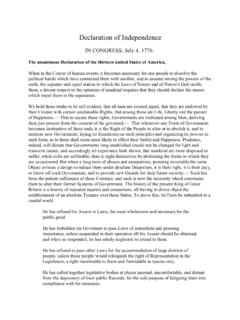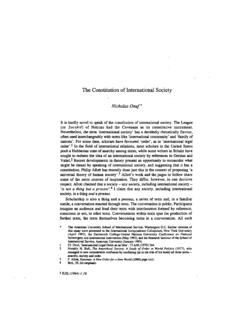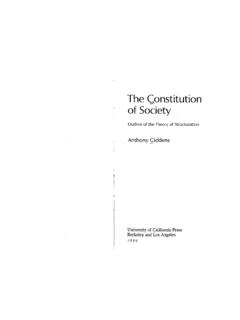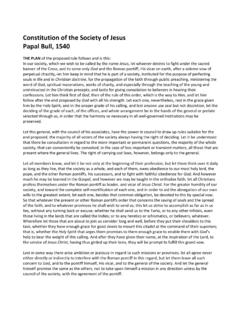Transcription of by Nicolo Machiavelli Written c. 1505 ... - constitution.org
1 The Princeby Nicolo MachiavelliWritten c. 1505, published 1515 Translated by W. K. MarriottThe Original Version of this Text wasRendered into HTML by Jon Roland of the constitution to PDF by Danny Stone as a Community Service to the constitution SocietyThe Prince1 Nicolo MachiavelliCHAPTER IHow Many Kinds Of Principalities ThereAre, And By What Means They AreAcquiredLL STATES, all powers, that have held andhold rule over men have been and areeither republics or are either hereditary, in which thefamily has been long established; or they are new are either entirely new, as was Milan toFrancesco Sforza, or they are, as it were, membersannexed to the hereditary state of the prince whohas acquired them, as was the kingdom of Naplesto that of the King of dominions thus acquired are eitheraccustomed to live under a prince, or to live infreedom; and are acquired either by the arms of theprince himself, or of others, or else by fortune orby Prince2 Nicolo MachiavelliCHAPTER IIConcerning Hereditary Principalities WILL leave out all discussion on republics,inasmuch as in another place I have Written ofthem at length, 1 and will address myself onlyto principalities.
2 In doing so I will keep to theorder indicated above, and discuss how suchprincipalities are to be ruled and say at once there are fewer difficulties inholding hereditary states, and those longaccustomed to the family of their prince, than newones; for it is sufficient only not to transgress thecustoms of his ancestors, and to deal prudentlywith circumstances as they arise, for a prince ofaverage powers to maintain himself in his state,unless he be deprived of it by some extraordinaryand excessive force; and if he should be sodeprived of it, whenever anything sinister happensto the usurper, he will regain have in Italy, for example, the Duke ofFerrara, who could not have withstood the attacksof the Venetians in '84, nor those of Pope Julius in'10, unless he had been long established in hisdominions.
3 For the hereditary prince has less causeand less necessity to offend; hence it happens thathe will be more loved; and unless extraordinaryvices cause him to be hated, it is reasonable Prince3 Nicolo Machiavelliexpect that his subjects will be naturally welldisposed towards him; and in the antiquity andduration of his rule the memories and motives thatmake for change are lost, for one change alwaysleaves the toothing for Prince4 Nicolo MachiavelliCHAPTER IIIC oncerning Mixed PrincipalitiesUT the difficulties occur in a newprincipality. And firstly, if it be notentirely new, but is, as it were, a memberof a state which, taken collectively, may be calledcomposite, the changes arise chiefly from aninherent difficulty which there is in all newprincipalities; for men change their rulerswillingly, hoping to better themselves, and thishope induces them to take up arms against himwho rules: wherein they are deceived, because theyafterwards find by experience they have gone frombad to worse.
4 This follows also on another naturaland common necessity, which always causes a newprince to burden those who have submitted to himwith his soldiery and with infinite other hardshipswhich he must put upon his new this way you have enemies in all those whomyou have injured in seizing that principality, andyou are not able to keep those friends who put youthere because of your not being able to satisfy themin the way they expected, and you cannot takestrong measures against them, feeling bound tothem. For, although one may be very strong inarmed forces, yet in entering a province one hasalways need of the goodwill of the these reasons Louis XII, King of France,The Prince5 Nicolo Machiavelliquickly occupied Milan, and as quickly lost it; andto turn him out the first time it only neededLodovico's own forces; because those who hadopened the gates to him, finding themselvesdeceived in their hopes of future benefit, would notendure the ill-treatment of the new prince.
5 It isvery true that, after acquiring rebellious provincesa second time, they are not so lightly lostafterwards, because the prince, with littlereluctance, takes the opportunity of the rebellion topunish the delinquents, to clear out the suspects,and to strengthen himself in the weakest to cause France to lose Milan the first time itwas enough for the Duke Lodovico to raiseinsurrections on the borders; but to cause him tolose it a second time it was necessary to bring thewhole world against him, and that his armiesshould be defeated and driven out of Italy; whichfollowed from the causes above Milan was taken from France boththe first and the second time. The general reasonsfor the first have been discussed; it remains toname those for the second, and to see whatresources he had, and what any one in his situationwould have had for maintaining himself moresecurely in his acquisition than did the King I say that those dominions which, whenacquired, are added to an ancient state by him whoacquires them, are either of the same country andlanguage, or they are not.
6 When they are, it isThe Prince6 Nicolo Machiavellieasier to hold them, especially when they have notbeen accustomed to self-government; and to holdthem securely it is enough to have destroyed thefamily of the prince who was ruling them; becausethe two peoples, preserving in other things the oldconditions, and not being unlike in customs, willlive quietly together, as one has seen in Brittany,Burgundy, Gascony, and Normandy, which havebeen bound to France for so long a time: and,although there may be some difference inlanguage, nevertheless the customs are alike, andthe people will easily be able to get on amongstthemselves. He who has annexed them, if hewishes to hold them, has only to bear in mind twoconsiderations: the one, that the family of theirformer lord is extinguished; the other, that neithertheir laws nor their taxes are altered, so that in avery short time they will become entirely one bodywith the old when states are acquired in a countrydiffering in language, customs, or laws, there aredifficulties, and good fortune and great energy areneeded to hold them, and one of the greatest andmost real helps would be that he who has acquiredthem should go and reside there.
7 This would makehis position more secure and durable, as it hasmade that of the Turk in Greece, who,notwithstanding all the other measures taken byhim for holding that state, if he had not settledthere, would not have been able to keep , if one is on the spot, disorders are seen asThe Prince7 Nicolo Machiavellithey spring up, and one can quickly remedy them;but if one is not at hand, they heard of only whenthey are one can no longer remedy them. Besidesthis, the country is not pillaged by your officials;the subjects are satisfied by prompt recourse to theprince; thus, wishing to be good, they have morecause to love him, and wishing to be otherwise, tofear him. He who would attack that state from theoutside must have the utmost caution; as long asthe prince resides there it can only be wrested fromhim with the greatest other and better course is to send coloniesto one or two places, which may be as keys to thatstate, for it necessary either to do this or else tokeep there a great number of cavalry and prince does not spend much on colonies, forwith little or no expense he can send them out andkeep them there, and he offends a minority only ofthe citizens from whom he takes lands and housesto give them to the new inhabitants; and thosewhom he offends, remaining poor and scattered,are never able to injure him.
8 Whilst the rest beinguninjured are easily kept quiet, and at the sametime are anxious not to err for fear it shouldhappen to them as it has to those who have beendespoiled. In conclusion, I say that these coloniesare not costly, they are more faithful, they injureless, and the injured, as has been said, being poorand scattered, cannot hurt. Upon this, one has toremark that men ought either to be well treated orcrushed, because they can avenge themselves ofThe Prince8 Nicolo Machiavellilighter injuries, of more serious ones they cannot;therefore the injury that is to be done to a manought to be of such a kind that one does not standin fear of in maintaining armed men there in place ofcolonies one spends much more, having toconsume on the garrison all income from the state,so that the acquisition turns into a loss, and manymore are exasperated, because the whole state isinjured.
9 Through the shifting of the garrison up anddown all become acquainted with hardship, and allbecome hostile, and they are enemies who, whilstbeaten on their own ground, are yet able to do every reason, therefore, such guards are asuseless as a colony is , the prince who holds a country differingin the above respects ought to make himself thehead and defender of his powerful neighbours, andto weaken the more powerful amongst them,taking care that no foreigner as powerful as himselfshall, by any accident, get a footing there; for itwill always happen that such a one will beintroduced by those who are discontented, eitherthrough excess of ambition or through fear, as onehas seen already.
10 The Romans were brought intoGreece by the Aetolians; and in every othercountry where they obtained a footing they werebrought in by the inhabitants. And the usual courseof affairs is that, as soon as a powerful foreignerenters a country, all the subject states are drawn tohim, moved by the hatred which they feel againstThe Prince9 Nicolo Machiavellithe ruling power. So that in respect to these subjectstates he has not to take any trouble to gain themover to himself, for the whole of them quickly rallyto the state which he has acquired there. He hasonly to take care that they do not get hold of toomuch power and too much authority, and then withhis own forces, and with their goodwill, he caneasily keep down the more powerful of them, so asto remain entirely master in the country.












